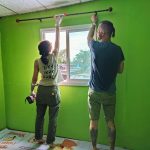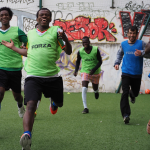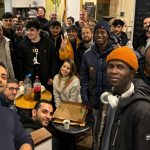by Patricia and Peter DeWit
I stopped waiting for words to make sense and made it my job to make sense of his words.
“I walk 15 days.”
Eye contact.
Be quiet. He is telling a small part of his story.
“Five days no eat, no drink.”
I touch his shoulder.
I’m 61 and this is something I can do at my age and it’s ok.
“ I not look at my mother for too long.”
Don’t cry. Don’t cry.
“You mother. We hug.”
I held him as I thought his mother would.
Hold. Hold. Hold.
Usually, I cringe when someone says, “You are a mother for me” and I worry that I will be a disappointing surrogate with an uncomfortable womb. But I’ve decided somehow that I am building a collection of mother hugs. Just like rescue workers in an earthquake dig as though they are unearthing their own child, their own sister, but all the while they are pulling out other people’s children and relatives from the rubble, kissing their faces, cheering their survival.
I truly believe there is a superpower in the acts of connectedness, that I can connect with the son of another woman, on her behalf, and there are people who connect with my children should they be Canadian refugees in their own cities, or in places where they don’t know the language, don’t have currency in their pockets. It’s a very different bucket list when you are a 23-year-old Afghan refugee and you “not look” at your mother for too long.” I find myself thinking with my pain. I wonder if that is empathy.
I may never see him again, and if I don’t, may there be mothers along the way until he can ‘look at his mother’ face to face again.
—
We did see this young man again. I invited Jumagul to our Language Exchange. Even though he knew little English and no French, he kept showing up week after week with his baseball cap on. We’d text quite often, and he always wanted to know how ‘my mother’ was doing. “Tell mother I say hello.” Slowly his French improved and he’d insert some French into our brief conversations. Not long ago he texted me with joy, “I got asylum in France.” Those are the best words we can hear as volunteers involved with refugees. He asked if he could make us a meal, but it seemed to never work out. This past Christmas we finally decided to have a special Afghan meal with a couple of our new friends from Syria. Safi, who now works for STCP, was to make Kabuli Pulao, the national Dish of Afghanistan, in our kitchen. I invited Jumagul to join us too. He was the last to arrive with a surprise dish of Kabuli Pulao too. The man can cook. We ate like Afghan kings and queens!
During the conversation around the table that evening we talked about Serve the City, and Jumagul asks, “Can I help too?” Of course you can. He’s now been volunteering. Last week I told him I needed help to serve coffee and tea and biscuits in the Stalingrad area. He was ready. When we got there, he smiled at me and said, “This is where I used to sleep.” I nodded knowingly, “And, I met you for the first time about 50 yards from here in that park.”
Sometimes we never see what happens with the connections we’ve made over all those moments of serving our cities. At other times, it is like we get a front-row seat and witness our special friends growing and changing before our eyes. They say that we get our rewards in the next life, maybe they are right. But I’ve been rewarded again and again by the smiles, the texts and of course, like Patricia, the building of our collection of mother and father hugs.







